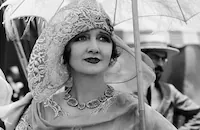The Racketeer
Brief Synopsis
Cast & Crew
Howard Higgin
Robert Armstrong
Carol Lombard
Roland Drew
Jeanette Loff
John Loder
Photos & Videos
Film Details
Technical Specs

Synopsis
Mahlon Keene, a suave racketeer, notices Mehaffy, a policeman, arrest a shabby, drunken violinist for vagrancy and bribes him to forget the charge; after Keene and his henchman depart, Rhoda Philbrook appears in a taxi, addresses the musician as "Tony," and has him driven away. Meanwhile, Keene arranges for a planned robbery to be delayed. At a charity function, Keene takes an interest in Rhoda when he detects her cheating at cards; she reveals that she has left her husband for the violinist, whom she hopes to regenerate; and for Rhoda's sake Keene arranges for Tony's appearance at a concert. When threatened by Weber, a rival, Keene shoots him and, after the concert, bids farewell to Rhoda. The rival gang take revenge on Keene, leaving Tony and Rhoda to a new life together.

Director
Howard Higgin
Cast

Robert Armstrong

Carol Lombard
Roland Drew

Jeanette Loff

John Loder
Paul Hurst
Winter Hall
Winifred Harris
Kit Guard
Al Hill
Bobby Dunn

Hedda Hopper
Bud Fine
Crew
David Abel
Ralph Block
D. A. Cutler
T. E. Dickson
Paul Gangelin
Paul Gangelin
Doane Harrison
Edward Jewell
A. A. Kline
Rollo Lloyd
Harry Poppe
Gwen Wakeling
George Webster
Clarence M. Wickes

Photo Collections
Film Details
Technical Specs

Articles
The Racketeer
The final entry in Lombard's Pathé Films series was The Racketeer (1929), in which she has the lead as a divorcee torn between two men -- a concert violinist (Roland Drew) who has hit the skids and a suave gangster (Robert Armstrong) who has the power to arrange a career-saving concert for the violinist. True to form for a gangster movie, matters are resolved in a final shoot-out between cops and mobsters. The film, shown in the U.K. as Love's Conquest, runs only 66 minutes.
Armstrong, soon to gain fame as Carl Denham in King Kong (1933), was in four of Lombard's Pathé Films; the others were Show Folks (1928), Ned McCobb's Daughter (1928) and Big News (1929). The two shared a pleasant chemistry, especially in The Racketeer, in which Armstrong's character Mahlon adores Lombard's Rhoda. Future gossip columnist Hedda Hopper appears in a small role.
Cinematographer David Abel, who also shot Lombard in Show Folks and Ned McCobb's Daughter, shows the budding star to good advantage. (He would later photograph some of the Fred Astaire/Ginger Rogers musicals at RKO.) The new microphones limited camera movement, however, and The Racketeer frequently depends on dialogue more than action in telling its story.
Producer: Ralph Block
Director: Howard Higgin
Screenplay: Paul Gangelin, A.A. Kline
Cinematography: David Abel
Original Music: Josiah Zuro
Editing: Doane Harrison
Costume Design: Gwen Wakeling
Cast: Robert Armstrong (Mahlon Keane), Carole Lombard (Rhoda Philbrooke, billed as "Carol Lombard"), Roland Drew (Tony Vaughan), Jeanette Loff (Millie Chapman), John Loder (Jack Oakhurst), Hedda Hopper (Karen Lee).
BW-66m.
by Roger Fristoe














